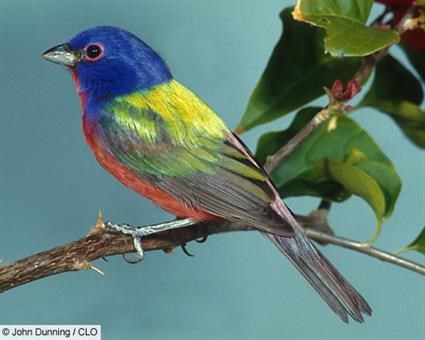Do you drink coffee? I myself am not so much a big coffee drinker, but I know lots of people are. If you consume even one cup of coffee a week, there is an indirect but very real way that you can help save wildlife. Please read on.
Songbirds (aka Passerines) are some of the most beloved animals we have in North America. They’re easy to find- look out of your window right now and I bet you’ll see at least one. Their songs make up the calming soundscapes of nature that people seek when they spend time outside. They’re oftentimes very beautiful. Here are some of my favorites-
 |
| Painted Bunting |
 |
| Indigo Bunting |
| Black and White Warbler |
There’s a whole subculture of birding enthusiasts across the country- it’s totally a thing. You’ll see them wandering around with binoculars, thousands of dollars worth of scopes and other optical equipment, and their trusty field guides in their packs. They will also likely have with them their “lifelist”- a list of all the birds of the continent with a little checkbox next to each bird for when said birder sees it. The satisfaction a birder feels when he or she checks a bird off his or her lifelist is comparable to seeing your favorite band play your favorite song live. Or eating a whole pan of brownies. Or whatever you find to be equally as gratifying.
One thing about many of the Passerines that makes them such a spectacle is their migratory habitats. Not all Passerines migrate, but many do. They head south in the fall to find food. Here in Alabama, the flocks of Cedar Waxwings are some of my favorites to look for in the winter. They come down from Canada for the winter and their soft wheezy calls make me think of cold winter mornings.
 |
| Cedar Waxwing |
Many Passerines take it a step further and fly across the Gulf all the way to Central or South America. Here, they find shelter and food in the vast expanses of forests the tropics have to offer. For whatever reason, they especially like to roost in the trees of the large coffee plantations that stretch for miles and miles. The trees provide just the right amount of shade for the little coffee plants to be maximally productive, and apparently are just right for the migratory birdies too. A study done by the Smithsonian Migratory Bird Center found that shade-grown coffee plantations support a greater amount of migrant species than other lands devoted to agriculture. Win-win, right? Migrant birds habitat is protected and the coffee growers have good harvests that help to fuel their country’s struggling economy.
It was a win-win until recently. Coffee growers have started to plant another species of coffee plant that does not require the shade from trees overhead. Without the need for trees overhead to provide shade, planters mow down huge tracts of land to plant a greater amount of coffee. Problem is, migrant birds are still migrating… but to what? Their winter homes are disappearing. And consequently, so are they. Fast. So fast that your kids may not see but a fraction of the songbird diversity that you grew up with.
But can we really hate on the Central and South American coffee planters? I say no. They and their economies need the money, and the difference in profit between planting shade and sun coffee is huge. They’re doing what they must to support their families and economies.
This is where we come in. As one of the largest consumers of Central and South American-grown coffee, America has the power to decrease the demand for sun coffee and increase the demand for shade coffee. And thanks to the Smithsonian Migratory Bird Center, it is easy. Next time you shop for coffee, look for this seal.

If the package bears this image, it means that the coffee inside has been grown and harvested from a certified shade coffee plantation. If you can’t find it at a local grocer, I encourage you to purchase your coffee online.
By making this small change, hundreds of species can be saved. Drink bird friendly coffee, save biodiversity!
I hope you will research this issue further. Google it up, folks. This is important.

No comments:
Post a Comment